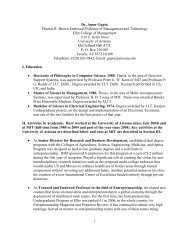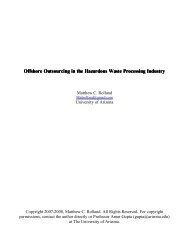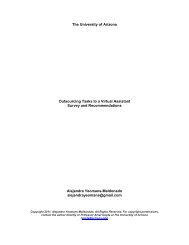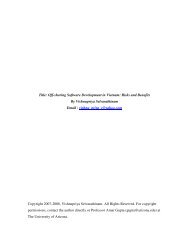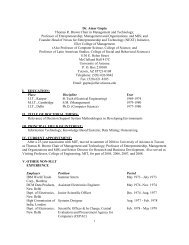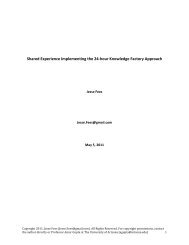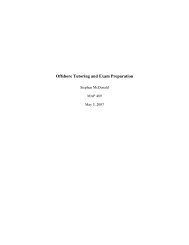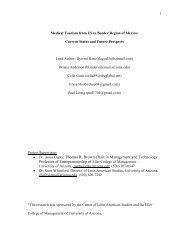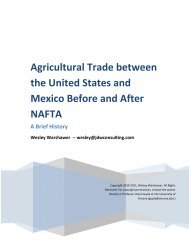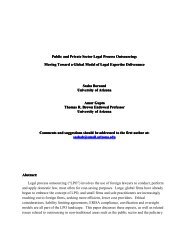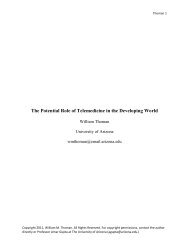Karthikeyan Ramadoss - University of Arizona
Karthikeyan Ramadoss - University of Arizona
Karthikeyan Ramadoss - University of Arizona
You also want an ePaper? Increase the reach of your titles
YUMPU automatically turns print PDFs into web optimized ePapers that Google loves.
UNIVERSITY OF ARIZONA<br />
Legality <strong>of</strong> Anti-Outsourcing Bills and Acts across<br />
the World<br />
<strong>Karthikeyan</strong> <strong>Ramadoss</strong><br />
karthik85@gmail.com<br />
Copyright 2012, <strong>Karthikeyan</strong> <strong>Ramadoss</strong>. All Rights Reserved. For copyright permissions, contact<br />
the author directly or Pr<strong>of</strong>essor Amar Gupta at The <strong>University</strong> <strong>of</strong> <strong>Arizona</strong> (agupta@arizona.edu.)
Abstract<br />
Outsourcing has been a major innovation that the market had made in the last two decades which<br />
has resulted in numerous benefits for the consumers as well as the economy <strong>of</strong> several countries.<br />
But this has also been accompanied by several hurdles that have been placed by governments all<br />
over the world. These hurdles have been made by means <strong>of</strong> legislations, bills, acts and directives.<br />
This paper tries to discuss the conflicts that these acts pose with respect to superior bodies like<br />
the WTO. Each country has a commitment to the WTO that they will promote free trade and will<br />
not discriminate against companies from other countries. These legislations are in direct conflict<br />
<strong>of</strong> this commitment. The paper also attempts to explain the partial treatment <strong>of</strong> organizations<br />
when it comes to implementing these acts and legislatives. In the US, the laws passed at the state<br />
level are in conflict with the constitutional duties <strong>of</strong> the federal government and the directives <strong>of</strong><br />
the WTO. In the European Union, the directive to protect private data has several ambiguous<br />
statements and involves a complicated process for third countries to be approved for outsourcing.<br />
There have also been several laws and directives passed by other countries to retain data within<br />
their borders, while some <strong>of</strong> the major data breach incidents have happened within their own<br />
countries. This paper discusses all these in detail and tries to throw light on the disadvantages <strong>of</strong><br />
prohibiting outsourcing.<br />
Keywords - Anti-<strong>of</strong>fshoring legislation, impact on domestic IT workforce; constitutionality <strong>of</strong><br />
restrictions on <strong>of</strong>fshoring; <strong>of</strong>fshoring <strong>of</strong> services; World Trade Organization;
Introduction<br />
Outsourcing is the concept <strong>of</strong> contracting a particular segment <strong>of</strong> work to an external entity.<br />
When this external entity is from another country, the same concept is called <strong>of</strong>fshoring. This<br />
concept <strong>of</strong> outsourcing/<strong>of</strong>fshoring has been in practice in the global business environment for a<br />
very long period <strong>of</strong> time. Offshoring has also been one <strong>of</strong> the primary reasons behind the<br />
economic improvements in many developing countries. Even though <strong>of</strong>fshoring is also done for<br />
manufacturing, the most common practice is to <strong>of</strong>fshore activities such as pay roll, call center<br />
activities, design, s<strong>of</strong>tware development, testing etc. This paper concentrates primarily on the<br />
<strong>of</strong>fshoring <strong>of</strong> services and the legal hurdles that are faced by companies in doing so. Typically<br />
the mechanism for <strong>of</strong>fshoring happens in the following manner – the source company provides<br />
the specification and requirement <strong>of</strong> the work to be done and the destination company uses those<br />
specifications to develop the product over a period <strong>of</strong> time and sends it back to the source<br />
company. This process is continued in an iterative manner until a satisfactory product is<br />
produced.
Major countries involved in <strong>of</strong>fshoring<br />
Traditionally, majority <strong>of</strong> the <strong>of</strong>fshoring work has originated from the United States <strong>of</strong> America<br />
and some <strong>of</strong> the developed countries in Europe. The following table lists the major countries<br />
from which <strong>of</strong>fshoring work originates. This list is based on the amount that is spent on<br />
outsourcing work to other countries. It is easily seen that these countries are all developed<br />
countries with a strong economy which allows them to take advantage <strong>of</strong> the <strong>of</strong>fshoring<br />
mechanism (UK no longer biggest outsourcing market outside US, 2010)<br />
• US<br />
• UK<br />
• France<br />
• Germany<br />
• Sweden<br />
Similarly the list <strong>of</strong> top destinations for outsourcing includes several developing countries which<br />
have seen their economy improving as a result <strong>of</strong> receiving outsourced work from the developed<br />
nations<br />
• India<br />
• China<br />
• Malaysia<br />
• Egypt<br />
• Indonesia
Reasons for Outsourcing<br />
There are several reasons behind why companies decide to outsource their work. The economic<br />
benefit is inarguably the biggest, but there are more compelling reasons behind companies’<br />
desire to <strong>of</strong>fshore their work to another company (Top 7 Outsourcing Advantages).<br />
Focus on core activities – Most <strong>of</strong> the companies that do outsourcing work have a strong<br />
competency in that particular area <strong>of</strong> expertise. As a result <strong>of</strong> this, they are able to place more<br />
focus on the job at hand and reduce cost and improve efficiency.<br />
Reduced Overhead – When companies outsource their work to other companies, it helps them<br />
reduce overhead by concentrating on their core and avoiding the fringe activities.<br />
Staffing flexibility – Outsourcing allows companies to add or reduce the number <strong>of</strong> employees<br />
required to complete the work that has been outsourced. They can do this without having to<br />
worry about staffing issues.<br />
Develop internal staff – When the company’s staffs interact with the destination company’s<br />
employees to get the work done, the skill set <strong>of</strong> the internal staff is greatly improved.<br />
Time zone difference – The difference in time zone between the two countries could prove<br />
beneficial in situations like call center jobs where customer service can be provided round the<br />
clock<br />
Reduced risk – There is a great reduction in risk levels as the destination company takes upon<br />
itself the task <strong>of</strong> handling most <strong>of</strong> the risk.
Hurdles<br />
In spite <strong>of</strong> the various advantages that are associated with outsourcing and <strong>of</strong>fshoring, the<br />
industry faces several hurdles. Some <strong>of</strong> these hurdles are man-made while some <strong>of</strong> them are<br />
natural. While the natural hurdles have been addressed by advancements in technology, the man-<br />
made hurdles prove to be a major challenge to the industry.<br />
• Geographical Distance<br />
• Time Difference<br />
• Cultural Differences<br />
• Rising Cost in developing nations<br />
• Legal Boundaries<br />
Advancements in communication, travel have more or less made the distance, time and cultural<br />
hurdles a non-issue. While rising cost in the developing nations has made companies rethink<br />
their outsourcing strategy, the rise is not acute enough for companies to totally abandon the idea<br />
<strong>of</strong> outsourcing. The biggest hurdles that companies are facing right now are the legal ones. The<br />
economic slowdown in most companies has resulted in a rapid increase in unemployment levels.<br />
Governments have started taking measures to retain the jobs that were previously being<br />
outsourced to other countries. This has resulted in numerous legislatives and directives being<br />
introduced in these countries which either prohibit or discourage companies from outsourcing<br />
their work to companies in other countries. While the US is trying to retain the jobs within its<br />
national boundaries, the EU is taking several steps to ensure that the jobs do not go to countries<br />
outside the European Union member countries.
Legal Boundaries<br />
Two <strong>of</strong> the major markets for outsourcing are USA and the EU. Legislations and directives have<br />
been introduced in both these places which make it extremely difficult for companies to<br />
outsource their work to companies in other countries. In some cases these legislations totally<br />
prohibit the outsourcing <strong>of</strong> work.<br />
United States <strong>of</strong> America<br />
The legal structure <strong>of</strong> United States <strong>of</strong> America has two levels – the state legislations and the<br />
federal laws. The federal laws supersede the state laws when there are conflicts between the two<br />
(Gupta & Sao, 2012). Every state has passed some kind <strong>of</strong> legislation that discourages<br />
companies from outsourcing their work to foreign countries.<br />
State Legislations<br />
Many states have tried to pass bills which do not directly prohibit the outsourcing <strong>of</strong> work to<br />
other countries, but instead discourage companies from outsourcing by placing one or several <strong>of</strong><br />
the following restrictions (Gupta & Sao, 2012).<br />
• Ban or Restriction on State Contract Work and/or Authorized U.S. Worker Requirement<br />
These legislations are drawn to prevent companies that try to get state contracts from<br />
recruiting workers who are not permanent residents <strong>of</strong> the state. This would prevent the<br />
government from awarding the contract to companies which have a major portion <strong>of</strong> their<br />
operations outside the state.<br />
• Call Center and Consumer Data Transfer Restrictions<br />
These legislations deal with work related to call centers. The legislations either prevent<br />
the call center jobs from leaving the state boundaries or mandate the call center<br />
employees to reveal their geographical location when required.
• In-state and/or U.S.-based Preference in State Contracts<br />
These legislations require the state to give preference to companies that are based within<br />
the state or within US while awarding contracts for work related to the state government.<br />
• Ban Against State Officials Signing on to Trade Agreements<br />
These set <strong>of</strong> legislations are focused towards preventing the state <strong>of</strong>ficials from signing<br />
any trade agreements that would make outsourcing <strong>of</strong> work easier for companies. These<br />
legislations are sometimes directly in conflict with the mandates <strong>of</strong> the World Trade<br />
Organization<br />
• State Tax / Funding / Studies on Outsourcing effects on State<br />
These legislations are geared towards preventing companies from receiving any kind <strong>of</strong><br />
tax benefits or funding from the state government if they outsource their work. These<br />
bills do not completely prohibit outsourcing but place the companies at a distinct<br />
disadvantage if they decide to do so.<br />
While the states do have the power and authority to decide what kind <strong>of</strong> companies can be<br />
awarded state contracts, some <strong>of</strong> these legislations extend into international realms. According to<br />
the constitution <strong>of</strong> the US, this is an area that has to be governed by the Federal government and<br />
these legislations by the state government can be seen as a direct conflict with the powers <strong>of</strong> the<br />
Federal government. The constitution clearly states that the states have jurisdiction regarding<br />
matters that concern the health, safety and the life <strong>of</strong> the public. Any issues regarding<br />
international relationships and trade are to be solely handled by the Federal government. More<br />
over the US has free trade agreements (FTA) with several countries which affect trade in goods<br />
and services, and protections for investors and intellectual property rights, among other topics.
The state legislatives are in conflict with all these agreements and hence will have to be looked at<br />
to understand their legality.<br />
Some <strong>of</strong> the pending bills in several states are listed in the following table<br />
State Ban or<br />
Restriction<br />
on State<br />
Contract<br />
Work<br />
and/or<br />
Authorized<br />
U.S.<br />
Worker<br />
Requireme<br />
nt<br />
AL HB312(2012<br />
) : Under<br />
existing law,<br />
there are no<br />
prohibitions<br />
against the<br />
state<br />
contracting<br />
with<br />
companies<br />
that ship the<br />
work to be<br />
performed<br />
<strong>of</strong>fshore. Thi<br />
s bill would<br />
prohibit<br />
work on<br />
certain<br />
contracts<br />
from being<br />
performed<br />
outside <strong>of</strong><br />
the United<br />
States<br />
Call Center<br />
and<br />
Consumer<br />
Data<br />
Transfer<br />
Restriction<br />
s<br />
In-state<br />
and/or U.S.based<br />
Preference<br />
in State<br />
Contracts<br />
HB216(2012)<br />
: This bill<br />
would require<br />
each<br />
awarding<br />
authority <strong>of</strong><br />
certain public<br />
works<br />
contracts to<br />
give<br />
preference to<br />
a bidder who<br />
has a<br />
workforce<br />
that consists<br />
<strong>of</strong> at least 50<br />
percent <strong>of</strong> all<br />
workers to be<br />
employed on<br />
the public<br />
works project<br />
who hold an<br />
Alabama<br />
driver's<br />
license or an<br />
identification<br />
card issued<br />
by the<br />
Ban Against<br />
State Officials<br />
Signing on to<br />
Trade<br />
Agreements<br />
State Tax /<br />
Funding /<br />
Studies on<br />
Outsourc-ing<br />
effects on<br />
State
CA AB1543(201<br />
2) : any<br />
public <strong>of</strong>ficer<br />
or person<br />
charged<br />
with the<br />
letting <strong>of</strong><br />
contracts for<br />
the<br />
construction<br />
, alteration,<br />
or repair <strong>of</strong><br />
public works<br />
or for<br />
purchasing<br />
materials for<br />
public use to<br />
only let<br />
those<br />
contracts to<br />
a person<br />
who agrees<br />
to use or<br />
supply<br />
materials<br />
produced or<br />
manufacture<br />
Alabama<br />
Department<br />
<strong>of</strong> Public<br />
Safety,
d in the<br />
United<br />
States, as<br />
prescribed<br />
FL HB549(<br />
2012) :<br />
Requires all<br />
state<br />
contracts <strong>of</strong><br />
more than<br />
certain<br />
amount to<br />
require any<br />
call-center<br />
services to<br />
be staffed<br />
by persons<br />
located<br />
within U.S.<br />
CS/CS/HB<br />
673 (2012) :<br />
Authorizes<br />
agency,<br />
county,<br />
municipality,<br />
school<br />
district, or<br />
other political<br />
subdivision <strong>of</strong><br />
state to<br />
provide<br />
preferential<br />
consideration<br />
to Florida<br />
business in<br />
awarding<br />
specified<br />
competitively<br />
bid contracts<br />
to purchase<br />
construction<br />
services<br />
HB153<br />
(2012) :<br />
requires<br />
agency,<br />
county,<br />
municipality,<br />
school<br />
district, or
other political<br />
subdivision <strong>of</strong><br />
state to grant<br />
specified<br />
preference to<br />
vendor<br />
located within<br />
state when<br />
awarding<br />
contract for<br />
printing
IL SB2186 (2011)<br />
: Provides that<br />
companies that<br />
lose 100 or<br />
more<br />
employees due<br />
to outsourcing<br />
<strong>of</strong> jobs are<br />
ineligible to<br />
receive<br />
procurement<br />
contracts with<br />
the State, units<br />
<strong>of</strong> local<br />
government, or<br />
school districts<br />
and to receive<br />
government<br />
grants, loans,<br />
tax incentives,<br />
or other<br />
economic<br />
incentives.<br />
HB1624(2011)<br />
: Provides that<br />
companies that<br />
lose 100 or<br />
more<br />
employees due<br />
to outsourcing<br />
<strong>of</strong> jobs are<br />
ineligible to<br />
receive<br />
procurement<br />
contracts with<br />
the State, units<br />
<strong>of</strong> local<br />
government, or<br />
school districts<br />
and to receive<br />
government<br />
grants, loans,<br />
tax incentives,<br />
or other<br />
economic
MA H3684(2011)<br />
: The state<br />
purchasing<br />
agent shall<br />
give<br />
preference,<br />
as far as may<br />
be<br />
practicable<br />
and to the<br />
extent<br />
permitted by<br />
the General<br />
Laws, federal<br />
law, and<br />
federal treaty,<br />
to products or<br />
incentives.
services<br />
manufactured<br />
or produced<br />
in the United<br />
States<br />
NJ A697(2012)<br />
: Prohibits<br />
businesses<br />
that<br />
outsource<br />
jobs<br />
overseas<br />
from<br />
receiving<br />
State<br />
contracts or<br />
grants;<br />
prohibits<br />
investment<br />
<strong>of</strong> State<br />
funds in<br />
such<br />
businesses.<br />
NY A3713(2011)<br />
: Enacts the<br />
New York<br />
consumer<br />
and worker<br />
protection act<br />
A3912 (2012) :<br />
Prohibits state<br />
funding to<br />
business<br />
entities that<br />
outsource jobs<br />
S1244(2012) :<br />
Prohibits state<br />
funding to<br />
business<br />
entities that<br />
outsource jobs<br />
A5163(2011) :<br />
Relates to<br />
enacting the<br />
financial<br />
incentives<br />
protection act
OR House Joint<br />
Memorial<br />
23(2011) : Urges<br />
President <strong>of</strong><br />
United States to<br />
direct United<br />
States Trade<br />
Representative<br />
not to enter into<br />
South Korean,<br />
Colombian and<br />
Panamanian free<br />
trade<br />
agreements.<br />
Urges Congress<br />
<strong>of</strong> United States<br />
to oppose South<br />
Korean,<br />
Colombian and<br />
Panamanian free<br />
trade<br />
agreements.<br />
Senate<br />
Memorial(2012) :<br />
request that the<br />
United States<br />
Congress<br />
reintroduce and<br />
pass the Trade<br />
Reform,<br />
Accountability,<br />
Development<br />
and Employment<br />
(TRADE) Act <strong>of</strong><br />
2009, and that<br />
the President<br />
sign the Act into<br />
law
TX SB1864(2011<br />
): require<br />
TxDOT to<br />
give<br />
preference to<br />
private sector<br />
providers<br />
whose<br />
principal<br />
place <strong>of</strong><br />
business is<br />
located in the<br />
state <strong>of</strong><br />
Texas. It<br />
would only<br />
apply to<br />
contracts<br />
relating to<br />
transportation<br />
projects for<br />
which the<br />
entire funding<br />
comes from<br />
either state<br />
funds, local<br />
funds, or a<br />
combination<br />
<strong>of</strong> state and<br />
local funds<br />
HB 785(2011):<br />
RESTRICTING<br />
STATE<br />
INVESTMENT<br />
IN AND<br />
PROVISION<br />
OF<br />
TAX BENEFIT<br />
S TO<br />
ENTITIES<br />
THAT<br />
OUTSOURCE<br />
JOBS TO<br />
FOREIGN<br />
COUNTRIES
WV SB115(2012<br />
) : requiring<br />
all work<br />
performed<br />
for the state<br />
by<br />
contractors<br />
be<br />
performed in<br />
the United<br />
States;<br />
making<br />
legislative<br />
findings;<br />
permitting<br />
the state to<br />
seek<br />
damages<br />
and void<br />
contracts for<br />
work done<br />
outside the<br />
country<br />
HB3120(201<br />
2) requiring<br />
all work<br />
performed<br />
for the state<br />
by<br />
contractors<br />
be<br />
performed in<br />
the United<br />
States;<br />
making<br />
legislative<br />
findings;<br />
permitting<br />
the state to<br />
seek<br />
damages<br />
and void<br />
contracts for<br />
work done<br />
outside the
country<br />
HB4290(201<br />
2) :<br />
prohibiting<br />
public<br />
agencies<br />
from<br />
awarding<br />
contracts to<br />
vendors<br />
who perform<br />
that work<br />
outside the<br />
United<br />
States;<br />
requiring<br />
vendors to<br />
certify that<br />
no work will<br />
be<br />
performed<br />
outside <strong>of</strong><br />
the United<br />
States
Federal Legislations<br />
There have been several instances when the WTO had to intervene and rule against laws passed<br />
by countries if it was proven that the law was against the general principles <strong>of</strong> the WTO. The<br />
following is an instance <strong>of</strong> the WTO over ruling an 82 year old US law (United States — Anti-<br />
Dumping Act <strong>of</strong> 1916).<br />
The European communities and Japan brought about a complaint on the US government’s 82<br />
year old anti-dumping law as they believed that the law was illegal under the WTO chapter. The<br />
WTO ruled that the law was indeed illegal and stipulated that the US government needed to take<br />
actions to resolve the issue. The US government had to accept the stipulation <strong>of</strong> the WTO due to<br />
its supremacy over individual government regulations. The US government in 2004 passed the<br />
Pub. L. 108—429, which repealed the antidumping provision <strong>of</strong> the Revenue Act <strong>of</strong> 1916. This<br />
example clearly shows that the WTO has a higher authority when it comes to settling<br />
international issues.<br />
With regard to outsourcing, there have been two distinct efforts by the federal government to<br />
pass laws which would make life difficult for companies that choose to outsource their work<br />
(Laws Against Outsourcing - Are They Necessary?, 2008). The call center consumer right to<br />
know act <strong>of</strong> 2003 stipulates that the call center employee should reveal their geographical<br />
location if the consumer asks for the information. This act was targeted at reducing the number<br />
<strong>of</strong> jobs being lost to other countries as the proponents <strong>of</strong> the law believed that the consumers<br />
would not like to talk to a call center employee from another country. This was a baseless<br />
assumption which could result in economic trouble for companies involved in call center<br />
operations.
The second legislative was the Thomas- Voinovich amendment which was aimed at preventing<br />
state contracts being awarded to a company that had its location outside the US. This is in direct<br />
conflict with the Government Procurement Agreement (GPA) which is part <strong>of</strong> the WTO<br />
agreement. The signatories have agreed that suppliers <strong>of</strong> goods and services in other signatory<br />
countries will be treated no less favorably than domestic suppliers in procurement covered by the<br />
Agreement, and that their laws, regulations and procedures relating to government procurement<br />
will be transparent and fair. The US law in effect violates this agreement by stating that<br />
companies located outside the country would not be considered for awarding state contracts.<br />
Bill Nr Year Description<br />
Call Center Consumer’s Right to Know Act<br />
Would require employees at a call center who either initiate<br />
or receive telephone calls to disclose the physical location <strong>of</strong><br />
s.1873 2003 such employees<br />
HR.2989 2004<br />
Appropriations for the Departments <strong>of</strong> Transportation and<br />
Treasury, and independent agencies for FY 2004. Senate<br />
version <strong>of</strong> bill includes a Thomas-Voinovich amendment that<br />
states “An activity or function <strong>of</strong> an executive agency that is<br />
converted to contractor performance under Office <strong>of</strong><br />
Management and Budget Circular A-76 may not be<br />
performed by the contractor at a location outside the United<br />
States except to the extent that such activity or function was<br />
previously been performed by Federal Government<br />
employees outside the United States.”
European Union’s Data Adequacy Act<br />
While the US has been passing acts and legislations that either directly or indirectly prohibits<br />
outsourcing, the European Union had passed a major directive regarding protection <strong>of</strong><br />
consumer’s personal data which in effect makes it extremely difficult for companies to outsource<br />
their work to companies outside the EU’s member countries. The data adequacy act <strong>of</strong> the EU<br />
stipulates that any company that outsources its work to companies outside the EU has to ensure<br />
that the destination country or territory ensures an adequate level <strong>of</strong> protection for the rights and<br />
freedoms <strong>of</strong> data subjects in relation to the processing <strong>of</strong> personal data. Even though this sounds<br />
like a reasonable directive on the outset, the process involved in getting a country approved by<br />
the European Union is a long drawn out process which involves a lot <strong>of</strong> complexity. Also the<br />
directive that has been laid down by the union is very ambiguous in terms <strong>of</strong> defining security<br />
and the framework to handle any violations.<br />
Complete steps involved in the approval process for a third country outside the EU (RINGOU,<br />
2009)<br />
1. The third country initiates the request to EU<br />
2. Official Request is addressed to the EU commission<br />
3. Analysis by the EU commission<br />
4. Dialogue with the third country about the information <strong>of</strong> Article 29 working party<br />
5. The Article 29 Working party's opinion is sought<br />
6. EU commission prepares a draft on the adequacy decision
7. Translated into 23 EU languages<br />
8. Opinion <strong>of</strong> representatives <strong>of</strong> member state under article 31 is sought<br />
9. 30 days <strong>of</strong> scrutiny by the European parliament<br />
10. Decision by the EU commission<br />
Beyond the member countries there have been very few countries which have been successfully<br />
approved by the commission as having acceptable security standards. The approved third<br />
countries are (Data Protection Bodies)<br />
Third Countries<br />
Australia<br />
Canada<br />
Guernsey<br />
Hawaii<br />
Hong Kong<br />
Isle <strong>of</strong> Man<br />
Israel<br />
Japan<br />
Jersey<br />
New Zealand<br />
South Korea<br />
Taiwan<br />
Thailand<br />
USA<br />
Even though the European Union claims to be impartial to the different third countries, the Safe<br />
Harbor agreement that has been formed with US indicates differently. US did not undergo the<br />
usual process to get approved by the commission. Instead a special safe harbor agreement was<br />
formed between the European Union and the U.S. Department <strong>of</strong> Commerce. The safe harbor—<br />
approved by the EU in 2000—is an important way for U.S. companies to avoid experiencing
interruptions in their business dealings with the EU or facing prosecution by European<br />
authorities under European privacy laws. Once again, this is in violation <strong>of</strong> the WTO stipulations<br />
which state that different countries should not be measured with different yard sticks while<br />
forming trade agreements.<br />
Actions by Countries outside the US and EU<br />
Apart from the EU and the US, several countries have passed acts and legislations that prevent<br />
the data from being transferred across borders (International Privacy Laws ). Most <strong>of</strong> these laws<br />
have been enacted to protect the privacy <strong>of</strong> consumers. But the original intent <strong>of</strong> these acts seems<br />
to be to discourage outsourcing <strong>of</strong> operations.<br />
In 2009, when the credit card information <strong>of</strong> a few hundred consumers were compromised by a<br />
call center in India, the issue was blown into great proportions and highlighted on all major<br />
media channels. The same can be told about multiple instances in several developing countries<br />
which have outsourcing as a key driving factor in their economic development. But when a<br />
similar incident happened in the developed countries, the attention that is given to the story is not<br />
as exaggerated. It also has to be noted that the incidents that happen in the developed countries is<br />
several magnitudes larger than the ones in the developing countries. It can be concluded that<br />
these data protection acts are being framed purely to prohibit countries from outsourcing their<br />
work. Listed below are some <strong>of</strong> the major data breaches that have happened in recent years<br />
(Largest Data Loss Incidents).
Country Company<br />
Name<br />
Description Year Affected<br />
Number <strong>of</strong><br />
consumers<br />
US Epsilon Epsilon, the world’s largest provider <strong>of</strong><br />
permission-based email marketing, has<br />
suffered a huge data breach. That<br />
means hackers may have swiped<br />
customer data belonging to the world’s<br />
biggest brands.<br />
China Shanghai<br />
Roadway<br />
D&B<br />
Marketing<br />
Services<br />
Co. Ltd<br />
US Heartland<br />
Payment<br />
Systems,<br />
Tower<br />
Federal<br />
Credit<br />
Union,<br />
Beverly<br />
National<br />
Bank<br />
US TJX<br />
Companies<br />
Inc<br />
US TRW,<br />
Sears<br />
Roebuck<br />
Firm may have illegally bought and sold<br />
customer information<br />
Malicious S<strong>of</strong>tware/Hack compromises<br />
unknown number <strong>of</strong> credit cards at fifth<br />
largest credit card processor<br />
Credit card numbers and transaction<br />
details.<br />
Hackers access credit-reporting<br />
database.<br />
2011 40 billion<br />
emails<br />
2012 150 million<br />
2009 130 million<br />
2007 94 million<br />
1984 90 million
US Sony<br />
Corporatio<br />
n<br />
US CardSyste<br />
ms, Visa,<br />
MasterCar<br />
d,<br />
American<br />
Express<br />
Names, addresses, email addresses,<br />
birthdates, passwords and logins,<br />
handle/PSN online ID, pr<strong>of</strong>ile data,<br />
purchase history and possibly credit<br />
card info.<br />
2011 77 million<br />
Major card processor breached 2004 40 million<br />
China Tianya Forum members' usernames and cleartext<br />
passwords leaked online by<br />
hackers<br />
Korea SK<br />
Communic<br />
ations,<br />
Nate,<br />
Cyworld<br />
US Steam<br />
(Valve,<br />
Inc.)<br />
US RockYou<br />
Inc<br />
US U.S.<br />
Departmen<br />
t <strong>of</strong><br />
Veterans<br />
Affairs<br />
Great<br />
Britain<br />
HM<br />
Revenue<br />
and<br />
Customs,<br />
TNT<br />
Names, email addresses, phone<br />
numbers, encrypted resident<br />
registration numbers and passwords<br />
accessed by hacker<br />
User names, passwords, game<br />
purchases, email addresses, billing<br />
addresses and encrypted credit card<br />
information<br />
2011 40 million<br />
2011 35 million<br />
2011 35000000<br />
User names and passwords 2009 32 million<br />
Names, Social Security numbers, and<br />
dates <strong>of</strong> birth <strong>of</strong> veterans<br />
Two missing CDs with addresses, dates<br />
<strong>of</strong> birth and National Insurance numbers<br />
<strong>of</strong> the entire HMRC child benefit<br />
database as well as 7 million banking<br />
details<br />
2006 26.5<br />
million<br />
2007 25 million
US Zappos Email addresses, billing and shipping<br />
addresses, phone numbers, the last<br />
four digits from credit cards, and<br />
passwords.<br />
2012 24 million<br />
China 7k7k Data for game site users 2011 20 million<br />
US Care2 Forced password reset. 2011 18 million<br />
German<br />
y<br />
T-Mobile,<br />
Deutsche<br />
Telekom<br />
Canada Canada<br />
Revenue<br />
Agency<br />
Korea Nexon<br />
Korea<br />
Corp<br />
US LaSalle<br />
Bank<br />
Customer data. 2008 17 million<br />
Vital records <strong>of</strong> 1985 Canadian<br />
taxpayers stolen from Toronto's District<br />
Taxation Center.<br />
Names, usernames, encrypted resident<br />
registration numbers and, passwords.<br />
Backup tape <strong>of</strong> BNY Mellon<br />
Shareholder services containing names,<br />
Social Security numbers, and possibly<br />
banking information.<br />
1986 16 million<br />
2011 13 million<br />
2008 12.5<br />
million<br />
Conclusion<br />
Free trade agreement between countries has resulted in economic development throughout the<br />
world and outsourcing is an extension <strong>of</strong> that principle in the modern world. Any attempt to stifle<br />
outsourcing will result in economic slowdown throughout the world. Even though the<br />
governments introduce these legislations in order to protect the domestic workers and improve<br />
the economy <strong>of</strong> the country, in the long run this will result in steep increase in prices and an<br />
inflated economy. This is certainly not a good method to improve the job market in any country.<br />
The bills that have been discussed in this paper are too broad and generic and leave it up to the
implementing body to interpret it in the way they want. This is a dangerous precedent in the legal<br />
institutions. Outsourcing helps companies to improve efficiency, reduce cost and be innovative<br />
in their core competency. Companies which indulge in outsourcing pass on a portion <strong>of</strong> the<br />
benefits to the consumer in ways <strong>of</strong> cost reduction. Prohibition <strong>of</strong> outsourcing will result in the<br />
industry losing out on all these benefits. Governments have to invest their resources in creating<br />
more jobs for the work force instead <strong>of</strong> trying to stifle the innovations <strong>of</strong> the market.<br />
Works Cited<br />
Laws Against Outsourcing - Are They Necessary? (2008, 7 19). Retrieved 5 2, 2012, from Citizen<br />
Economists: http://www.citizeneconomists.com/blogs/2008/07/19/laws-against-outsourcingare-they-necessary/<br />
UK no longer biggest outsourcing market outside US. (2010, 4 30). Retrieved 5 2, 2012, from<br />
ComputerWeekly.com: http://www.computerweekly.com/news/1280092712/UK-no-longerbiggest-outsourcing-market-outside-US<br />
Anderson, S. (2003). Creeping Protectionism. Retrieved 5 2, 2012, from<br />
http://www.nfap.net/researchactivities/studies/creepingprotect.pdf<br />
Data Protection Bodies. (n.d.). Retrieved 5 2, 2012, from Europian Comission:<br />
http://ec.europa.eu/justice/data-protection/bodies/index_en.htm<br />
Dugdale, S. (2010). Regulations on Outsourcing. Retrieved 05 2, 2012, from<br />
http://next.eller.arizona.edu/courses/24hourKnowledgefactory/Spring2010/student_papers/St<br />
ephanieDugdale.pdf<br />
Gupta, A., & Sao, D. (2012). The Legal Validity <strong>of</strong> Anti-Offshoring Laws, Bills, and Policies in the United<br />
States and Other Countries.<br />
International Privacy Laws . (n.d.). Retrieved 5 2, 2012, from Information Shield:<br />
http://www.informationshield.com/intprivacylaws.html<br />
Largest Data Loss Incidents. (n.d.). Retrieved 5 2, 2012, from Dataloss DB:<br />
http://datalossdb.org/index/largest
Outsourcing Statistics. (n.d.). Retrieved 5 2, 2012, from Outsourcing Defined:<br />
http://outsourcingdefined.com/outsourcing-statistics/<br />
RINGOU, N. (2009, 9 30). Data Protection European. Retrieved 5 2, 2012, from Israel Government Portal:<br />
http://www.justice.gov.il/NR/rdonlyres/619C144A-8C03-4EDE-92A5-<br />
79666A19460C/21169/DataProtectionIsrael.pdf<br />
Top 7 Outsourcing Advantages. (n.d.). Retrieved 5 2, 2012, from About.com:<br />
http://operationstech.about.com/od/<strong>of</strong>ficestaffingandmanagem/a/OutSrcAdvantg.htm<br />
United States — Anti-Dumping Act <strong>of</strong> 1916. (n.d.). Retrieved 5 2, 2012, from World Trade Organization:<br />
http://www.wto.org/english/tratop_e/dispu_e/cases_e/ds136_e.htm



